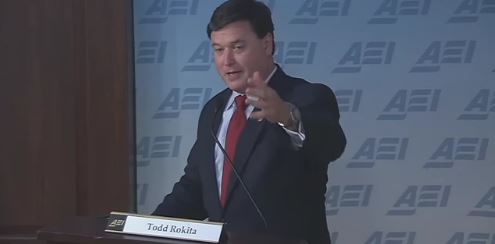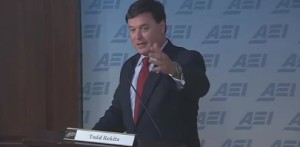Future of Conservative Education

As the 2014 midterm elections near, conservative Republicans have found themselves in a situation that demands more than a mere denunciation of President Obama’s policies. There has been no shortage of criticism from the GOP as to how the Obama administration has accelerated the growth of a sprawling federal bureaucracy, but have Republicans suggested any viable policy alternatives to the government based programs of the Obama presidency?
In the arena of federal education policy, one innovator is helping to craft a state and localized solution to the Washington controlled education system. Congressman Todd Rokita (R-IN) is adamant that discretion over a child’s fate should not be exercised by some unknown federal bureaucrat residing in the bowels of the Department of Education. As the chairman of the Subcommittee on Early Childhood, Elementary, and Secondary Education, Rokita has positioned himself well to lead the educational reform efforts and just recently unveiled a brand new bill at a recent gathering hosted by the American Enterprise Institute (AEI).
The CHOICE Act is just one of a series of steps that Rokita has taken that looks to ameliorate the broken educational structure in place by providing more school choice, increased financial flexibility for school districts, and a monetary path that follows the students rather than the bureaucracy. Rather than continue the Washington orthodoxy of throwing more money at the problem, Rokita noted that despite increased expenditures on federal education, Rokita cited that performances in schools have “plateaued.”
From Rokita’s perspective, the answer lies in delegating more authority over education to the states. He certainly did not call for the federal government to abandon education entirely, but it has become clear that relying on local and state authorities would be best for the kids. General accountability within the public schools is key to ensuring that schools are meeting certain academic standards, but Rokita made a fine distinction between accountability to federal authorities and state/local figures.
Only those who have a personal and localized familiarity with a particular school are best to judge how it is performing and in the event that it is not, what steps should be taken to address any problems that may exist within that particular district. This approach while noble, will likely find itself at odds with consolodationists.
Unfortunately, efforts at furthering the recommendations made by Rokita have met resistance by the Obama Justice Department, which recently filed suit against the state of Louisiana for its allegedly unlawful statewide voucher program that enables students who attend poor performing schools to enroll at a private school. Governor Bobby Jindal responded with a stinging criticism of the executive decision writing that Obama and Eric Holder may appear to be representing the best interests of American youngsters, but in actuality are destroying any hope kids may have of enhancing their chances of economic and social elevation.
The debate over the future of American education is one that has existed since the beginning of the American republic. The niceties over education policy itself are likely a relatively recent development (the last 30 years or so) but the nature of our federal system is one that even pre-dates the ratification of the Constitution. The states and the federal government have been locked in an endless struggle to secure more powers for themselves and the contention over the future of schooling in American is just another manifestation of that difference of opinion.





